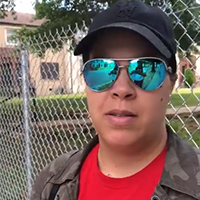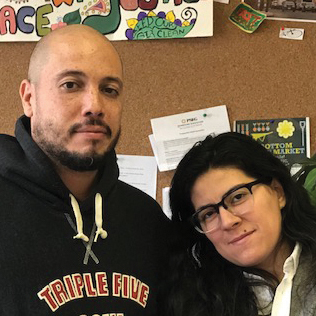
Nicole Odom, Barry Farms
Tenants Organize to Stop Gentrification in Barry Farms
By Nicole Odom,
Organizing Assistant at Empower D.C.
Barry Farm in southeast Washington, DC had been a public housing site for a long time. In 2010, the District of Columbia Housing Authority made plans to redevelop the run-down buildings and replace the apartments one for one. After we were notified of the replacement plans, we didn’t hear anything further for quite a while. Then suddenly HUD approved the demolition of the homes and created a proposal with other developers to build mixed-income homes and space for retail as well. Residents were going to be phased back into the property once the redevelopment was done--which didn’t make any sense to me. Why couldn’t we come back all at once, and in a short period of time?
Residents were upset about this new proposal. It didn’t consider our needs and vision. And it reduced the number of apartments available for low income households. The residents formed a coalition called the Barry Farm Tenants and Allies Association to demand a stop to the demolition and the creation of a new proposal that considered their needs.
I had lived in Barry Farm for nine years with my husband and children. Two years ago, I decided to organize with the other residents because it was a way for me to gain the confidence and knowledge to help myself cope with the possibility of losing my home. Over time the advocacy actions empowered me to fight for myself. Joining with the tenants association also connected me to the broader Barry Farm community, who I did not know well when I lived at there. Now I have a lot of relationships with my neighbors.
The types of organizing activities we conducted were meeting with city council members and the board of commissioners. We spoke about our situation and the need for us to be part of the redevelopment process. I have also helped residents come forward to share their stories with legislators so they understand our side of the situation and help us regain control of our community.
Our advocacy efforts have been successful so far. The District of Columbia appeals court ruled in favor of Barry Farm Tenants and Allies Association, which appealed the zoning approval for the site in the middle of 2018. The city was told to explain concerns about density and unit sizes, so the District of Columbia Housing Authority withdrew the plan and we were told a revised plan would be presented soon.
There is still no sign of the plan. Many of the old homes at Barry Farm have already been demolished and residents have already moved to other parts of the city. The tenants association is currently working on our own vision for the redevelopment of Barry Farm. We want to make sure it includes everybody’s input. Once it is finished, we will submit it to the city to be considered.
The fight against gentrification continues!

Ironbound Community Corporation
Newark Advocates Work with City Council and the Mayor to Guarantee Low Income Renters Right to Counsel in Eviction Court
Maria Lopez-Nunez, Community Development and Environmental Justice Director, Ironbound Community Corporation and Daniel Wiley, Housing Justice Manager, Ironbound Community Corporation
Newark, New Jersey’s Right to Counsel Ordinance passed in 2018 as a response to the gentrification pressures happening here. We both work at Ironbound Community Corporation and were constantly asked by residents for help with eviction notices. We also knew of cases where landlords were evicting entire buildings of undocumented tenants. Landlords would threaten to call ICE if the tenants didn’t leave, and of them many did just to avoid being deported. Many renters did not know their rights in these instances and were very vulnerable.
We were first introduced to the right to counsel concept through Arnold Cohen, Policy Director at the Housing and Community Development Network of New Jersey, who connected us to Susannah Leahy from Right to Counsel NYC Coalition. That coalition was successful in getting an ordinance passed in New York City that guaranteed low income renters the right to representation during eviction proceedings. Once we met with Susannah, we passed on the information to our Executive Director, who met with Mayor Ras Baraka about implementing such a policy in Newark. The Mayor and his staff were very supportive of the concept and were proactive in getting the ordinance passed.
The Newark Right to Council Coalition was formed in early 2018 to ensure the ordinance became law. The Coalition is made up of legal service organizations, nonprofits, lawyers, academics, and community residents. Although the mayor was supportive of the Right to Council Ordinance, the coalition wanted to make sure the strongest ordinance was passed. In August of 2018, a weaker version almost became law, but thanks to the objections from the community, a much stronger ordinance was later drafted and passed.
The ordinance passed in December of 2018. The city now must find funding and set up the pilot program by April of 2019. The participants selected for the program will have incomes at or below 200% of the poverty level, can be renters or homeowners undergoing foreclosure, and will be residents of Newark. The city is willing to fund the program at one million dollars from the outset. If the program proves successful, funding for the program could increase. We hope that the program will show results like the one in New York City. In the first year of program implementation, the eviction rate in New York City decreased by 14%. We are going to be involved in all stages of the process, to ensure the program is successful.